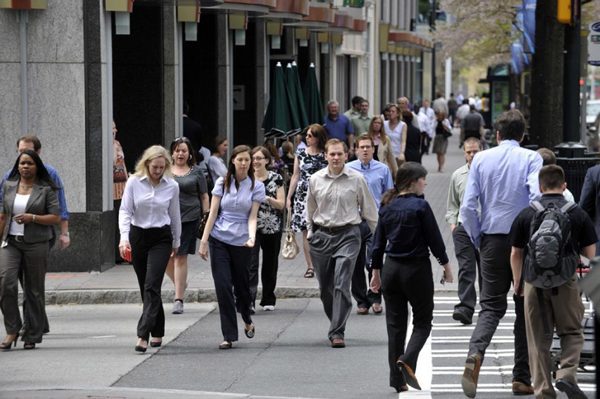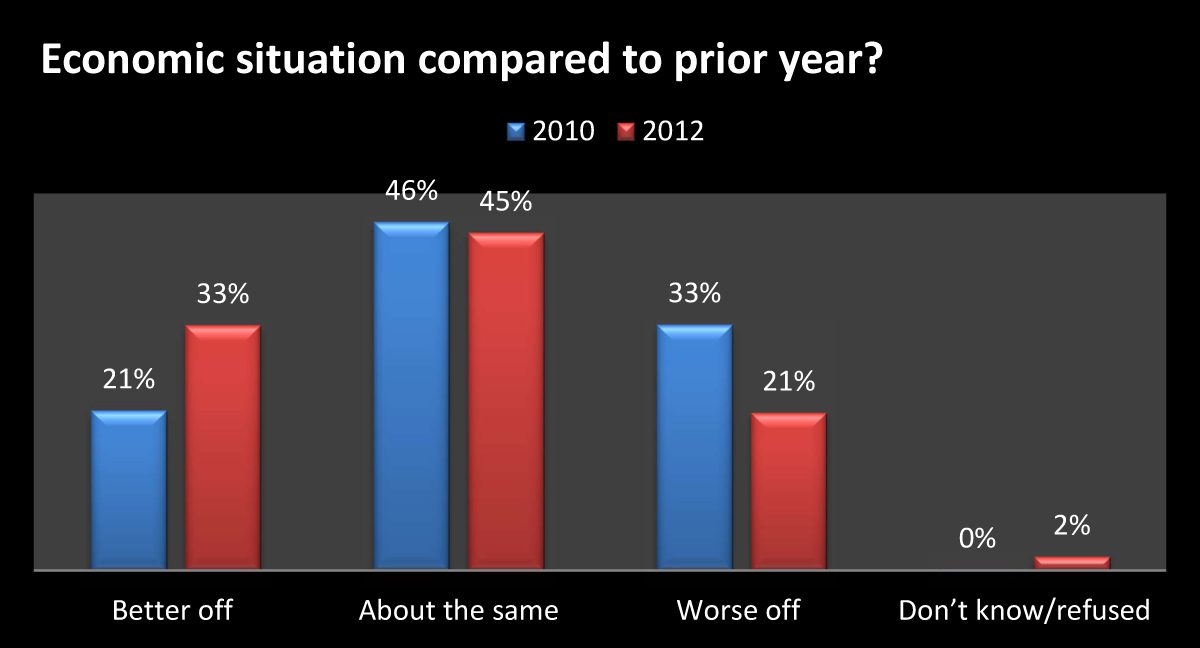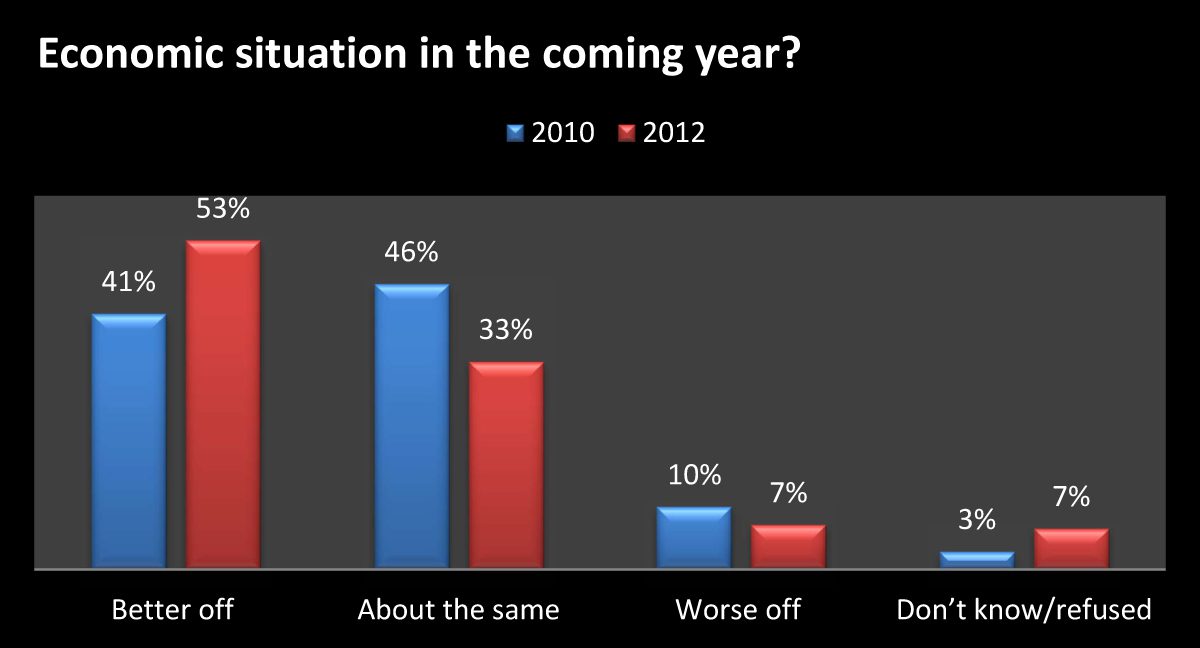Will optimism on economy continue post-election?

For at least the last 50 years, polling organizations have been using two simple questions to get respondents to describe how the last year treated them from an economic viewpoint and how they think the next one will be:
-
Compared to this time last year, would you say your current economic situation is better, about the same, or worse?
-
Thinking ahead about your economic situation, do you believe that you will be better off, about the same, or worse off a year from now than you are now?
The ability of these questions to help predict economic conditions is stronger when the responses are on the optimistic side. More pessimistic answers (when the situation is worse than last year or will be worse next year) almost always occur after the economy has clearly shifted to a downward spiral, but optimistic sentiments (situation is better or will be better) are more often obtained prior to an improvement in economic conditions.
| Read more: The Charlotte-Mecklenburg Annual Survey is a public opinion survey conducted by the UNC Charlotte Urban Institute since 1980. Click here to find out more. |
The UNC Charlotte Urban Institute has been doing an annual survey of Mecklenburg County adults for more than 30 years. The 2012 survey* contained the two questions above, about the economy.
Findings:
The response pattern to the first question – whether the respondent’s economic situation is better, about the same, or worse over the past year – is illustrated in the following table, along with the responses to the same question from 2010.

Two points are obvious. First, people are feeling better about the economy than in 2010 by a little more than 11 percentage points, which isn’t bad since many pundits feel there has been little real movement in the economic situation in the past two years. Second, these scores are among the least optimistic that have been seen across the 50 or more years the questions have been used to gauge opinions about the economy.
The survey also yields demographic data so that findings like those above can be studied to see which demographic groups are more on the optimistic or pessimistic ends of the spectrum. Most of the findings of that analysis follow expected patterns. Young folks are generally more optimistic than are older folks, and this is clearly true on this indicator, although young people have suffered more in this recession than most other groups. But even that condition did not deter them from being more likely to say their situation improved over the last year. Employed people and those with higher incomes were more likely to say conditions had improved over the year – no surprise there. Other variables like gender, race and home ownership showed little or no variation across the subgroups within these larger designations.
The second question – asking respondents about their economic situation a year from now – yields the following findings:

This question is more interesting than the previous one because it is about the future, and it certainly has an association with that most important feature for the economy: consumer confidence. More than two-thirds of the country’s economy is made up of consumer activity, and as confidence goes up so does consumer activity, resulting in a growing economy. Comparing the responses from 2012 with those from 2010 indicates that about 12 percent more of the respondents believe they will be better off next year than they are at the time the survey was administered. A small percentage of respondents believe they will be worse off in a year. The data in this graph show, to some degree, the innate optimism of the American people. Even in the depths of the economic downturn (2010), approximately 40 percent of the respondents in Mecklenburg County felt they would be better off in the next year.
As with the previous question, the primary drivers of this more positive outlook are the young folks. Approximately 73 percent of those between 18 and 24 believe they will be better off this time next year compared to today. Conversely, just 27 percent of those 65 and over believe they will be better off in a year. Marital status of the respondents also shows some interesting differences. Those living with a partner (74.1 percent) and those never married (66.7 percent) are more likely to see themselves better off in a year than those who are married (50.9 percent). Blacks (65.2 percent) and Latinos/Hispanics (77.8 percent) are more optimistic for the next year than whites (50.8 percent).
In the polls leading up to the Nov. 6 election and in the exit polls of voters on Election Day, this more optimistic view about the year to come was replicated in many parts of the nation; Mecklenburg County is not an isolated case. In addition, recent census data indicate young people who were forced to move in with their parents or who never left home are beginning to move out.
However, with every positive announcement about a possible speeding up of the recovery, there seems to be a concurrent announcement or analysis about the economic headwinds that could stall growth. The turmoil of the Arab Spring, the slowing of the emerging economies (especially China), the war in Afghanistan, the Iranian nuclear threat, the Israeli response to that threat and slowing demand for goods in Europe can and, in some cases, are having a negative effect on the U.S. economy.
The two conditions more likely to affect our prosperity in the immediate future, however, are domestic rather than international. A hotly contested presidential election is always a distraction. At the national level, what we can count on is that nothing of consequence happens in the six months leading up to the election, and perhaps this can be expanded to a year. In addition to a presidential election, all of the members of the U.S. House of Representatives and at least one-third of the Senate were also up for re-election. Add to this governors, mayors, state legislatures, county commissioners and city councils and one can see how disruptive this can be. Getting past the election will bring a much needed stability to the system – a stability that is much more conducive to economic expansion.
But this election year, we have another factor that will need immediate attention if we are to expect continued economic recovery. The fiscal cliff – automatic cuts scheduled to occur across the national budget (resulting from the failure of the nonpartisan committee that was charged to come up with a plan for dealing with the growing national debt and deficits) – will almost certainly stall out the economic recovery and may cause another recession.
If the completion of the election cycle is followed by developing a nonpartisan agreement regarding the budgetary cuts poised to occur at the beginning of 2013, the optimistic survey results described above may in fact turn out to be accurate. The economy shows signs of being ready to perform at a higher level, assuming some of the destabilizing factors are resolved.
* The 2012 Mecklenburg Annual Survey details: A total of 400 telephone interviews were completed, resulting in a margin of error of approximately ± 4.9 percentage points at the 95 percent confidence level. Of the total 400 interviews, 320 (80 percent) were completed with respondents on landline telephones, and 80 (20 percent) were completed with respondents on cell phones. The survey period extended from May 30 to June 17, 2012.